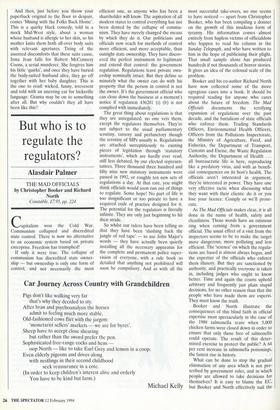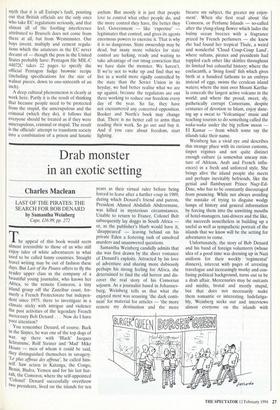But who is to regulate the regulators?
Alasdair Palmer
THE MAD OFFICIALS by Christopher Booker and Richard North Constable, f7.95, pp. 224 Capitalism won the Cold War. Communism collapsed and discredited state control. There is now no alternative to an economic system based on private enterprise. Freedom has triumphed!
If only it were true. The collapse of communism has discredited state owner- ship — but ownership is only one form of control, and not necessarily the most efficient one, as anyone who has been a shareholder will know. The aspiration of all modern states to control everything has not been dented by the collapse of commu- nism. They have merely changed the means by which they do it. Our politicians and officials now reach for methods of control more efficient, and more acceptable, than outright state ownership. They have discov- ered the perfect instrument to legitimate and extend that control: the government regulation. Regulations leave private own- ership nominally intact. But they define so minutely what the owner can do with his property that the person in control is not the owner. It's the government official who can close down the business at a moment's notice if regulation 436201 (i) (b) is not complied with immediately.
The great thing about regulations is that they are unregulated: no one vets them, except the regulators themselves. They're not subject to the usual parliamentary scrutiny, cursory and perfunctory though the scrutiny of MPs usually is. Regulations are attached surreptitiously to existing pieces of legislation through 'statutory instruments', which are hardly ever read, still less debated, by our elected represen- tatives. Three thousand three hundred and fifty nine new statutory instruments were passed in 1992, or roughly ten new sets of regulations a day. At that rate, you might think officials would soon run out of things to regulate. Some hope! No part of life is too insignificant or too private to have a required code of practice designed for it. The potential for the regulators is literally infinite. They are only just beginning to hit their stride.
So whilst our rulers have been telling us that they have been 'slashing back the jungle of red tape' — to use John Major's words — they have actually been quietly installing all the necessary apparatus for the complete and permanent police super- vision of everyone, with a rule book so detailed that anything not prohibited will soon be compulsory. And as with all the
most successful take-overs, no one seems to have noticed — apart from Christopher Booker, who has been compiling a dossier on the growth of this insidious form of tyranny. His information comes • almost entirely from hapless victims of officialdom who happen to read his column in the Sunday Telegraph, and who have written to him in the hope of publicising their plight. That small sample alone has produced hundreds if not thousands of horror stories. It gives an idea of the colossal scale of the problem.
Booker and his co-author Richard North have now collected some of the more egregious cases into a book. It should be required reading for anyone who cares about the future of freedom. The Mad Officials documents the terrifying expansion of regulations over the past decade, and the battalions of state officials who enforce them. Trading Standards Officers, Environmental Health Officers, Officers from the Pollutions Inspectorate, the Ministry of Agriculture, Food, and Fisheries, the Department of Transport, Customs and Excise, the Waste Regulation Authority, the Department of Health . . . all bureaucratic life is here, reproducing like a predatory virus, and with as benefi- cial consequences on its host's health. The officials aren't interested in argument, they're interested in power. They have one very effective tactic when discussing what they want with their clients: do it or you lose your licence. Comply or we'll prose- cute.
As The Mad Officials makes clear, it is all done in the name of health, safety and cleanliness. Those words have an ominous ring when coming from a government official. The usual effect of a visit from the inspectors seems to be to make the target more dangerous, more polluting and less efficient. The 'science' on which the regula- tions are based is almost always bogus, and the expertise of the officials who enforce them illusory. But they are sanctioned by authority, and practically everyone is taken in, including judges who ought to know better. Time and again the courts uphold arbitrary and frequently just plain stupid decisions, for no other reason than that the people who have made them are experts. They must know the truth.
Booker and North illustrate the consequences of this blind faith in official expertise most spectacularly in the case of the 1988 salmonella scare when 5,000 chicken farms were closed down in order to ensure that only those free of salmonella could operate. The result of this deter- mined exercise to protect the public? A 64 per cent increase in salmonella poisonings, the fastest rise in history.
What can be done to stop the gradual elimination of any area which is not pre- scribed by government rules, and in which people are allowed to take decisions for themselves? It is easy to blame the EC, but Booker and North effectively nail the myth that it is all Euiope's fault, pointing out that British officials are the only ones who take EC regulations seriously, and that almost all of the footling interference attributed to Brussels does not come from there at all, but from Westminster. Our boys invent, multiply and cement regula- tions which the amateurs in the EC never dreamt of — though the pros in the United States probably have: Pentagon file MIL-C 44072C takes 22 pages to specify the official Pentagon fudge brownie recipe (including specifications for the size of walnut pieces, down to one-sixteenth of an inch).
A deep cultural phenomenon is clearly at work here. Partly it is the result of thinking that because people need to be protected from the stupid, the unscrupulous and the criminal (which they do), it follows that everyone should be treated as if they were unscrupulous, criminal or stupid. The result is the officials' attempt to transform society into a combination of a prison and lunatic asylum. But mostly it is just that people love to control what other people do, and the more control they have, the better they feel. Government — like `expertise' legitimates that control, and gives its agents enormous powers to exercise it. That is why it is so dangerous. State ownership may be dead, but many more vehicles for state control are lurking, ready and waiting to take advantage of our smug conviction that we have slain the monster. We haven't. If we're not to wake up and find that we live in a world more rigidly controlled by the state than the Soviet Union in its heyday, we had better realise what we are up against, because the regulators are out there working to reduce our freedom every day of the year. So far, they have not encountered any concerted opposition. Booker and North's book may change that. There is no better call to arms than reading their work. So go out and buy it. And if you care about freedom, start fighting.



















































 Previous page
Previous page